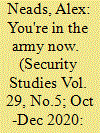|
|
|
Sort Order |
|
|
|
Items / Page
|
|
|
|
|
|
|
| Srl | Item |
| 1 |
ID:
164293


|
|
|
|
|
| Summary/Abstract |
Military capacity building (MCB) is as problematic as it is ubiquitous, with the British experience in Sierra Leone providing a rare example of ostensible success. This article critiques the dominant conceptualisation of MCB as purely a principal–agent (PA) problem, using military change scholarship to examine the impact of wartime British intervention on the Sierra Leonean armed forces. Here, indigenous military change was both externally driven and fundamentally adaptive in nature, allowing MCB to bypass some of the difficulties predicted by PA models. However, this adaptive approach nonetheless failed to reconcile Western military values with prevailing Sierra Leonean culture, complicating post-war stabilisation efforts.
|
|
|
|
|
|
|
|
|
|
|
|
|
|
|
|
| 2 |
ID:
178504


|
|
|
|
|
| Summary/Abstract |
Military assistance is a perennial feature of international relations. Such programmes typically aim to improve the effectiveness of local partners, exporting the donor's way of war through the provision of training and equipment. By remaking indigenous armies in their own image, donors likewise hope to mitigate the profound agency costs associated with the transfer of military capability. But, while technical and organisational transformations can provide notable battlefield advantages, the philosophies underlying such innovations are not so easily propagated. Instead, new tactics, structures, and technologies typically intersect with pre-existing local schemata of war, producing novel if sometimes dysfunctional hybrid praxes. According to principal-agent theory, the application of greater conditionality in the provision of military assistance should improve the fidelity of military diffusion, aligning agents’ divergent interests with their principals’ goals. In practice, however, principal-agent exchanges rarely exist in isolation. Examining the modernisation of nineteenth-century Japan as a case study in military diffusion, this article argues that competition between rival patrons allows recipient states to play would-be principals off against each other, bypassing conditionality by replicating a marketplace for military assistance. In so doing, however, agents trade functionality for sovereignty in their military diffusion.
|
|
|
|
|
|
|
|
|
|
|
|
|
|
|
|
| 3 |
ID:
177067


|
|
|
|
|
| Summary/Abstract |
Military integration is intended to facilitate postconflict stabilization by creating unified armed forces from formerly antagonistic armed groups. However, integrated armies often struggle to overcome the factional identities of their soldiers, raising questions about interventionists’ ability to produce military cohesion during such processes. Yet, in the established scholarship on military cohesion, largely derived from the study of Western armed forces, internal small-group social dynamics are privileged over and above broader societal and political identities. This article examines the postconflict military integration program conducted in Sierra Leone to test extant theories of military “social cohesion.” Contrary to theoretical expectations, military cohesion in Sierra Leone proved highly reliant on wider (and highly politicized) societal identities, undermining integration efforts. This finding not only challenges existing understandings of social cohesion and its determinants but also the utility of military integration as a vehicle for postconflict stabilization and civil-military change.
|
|
|
|
|
|
|
|
|
|
|
|
|
|
|
|
|
|
|
|
|